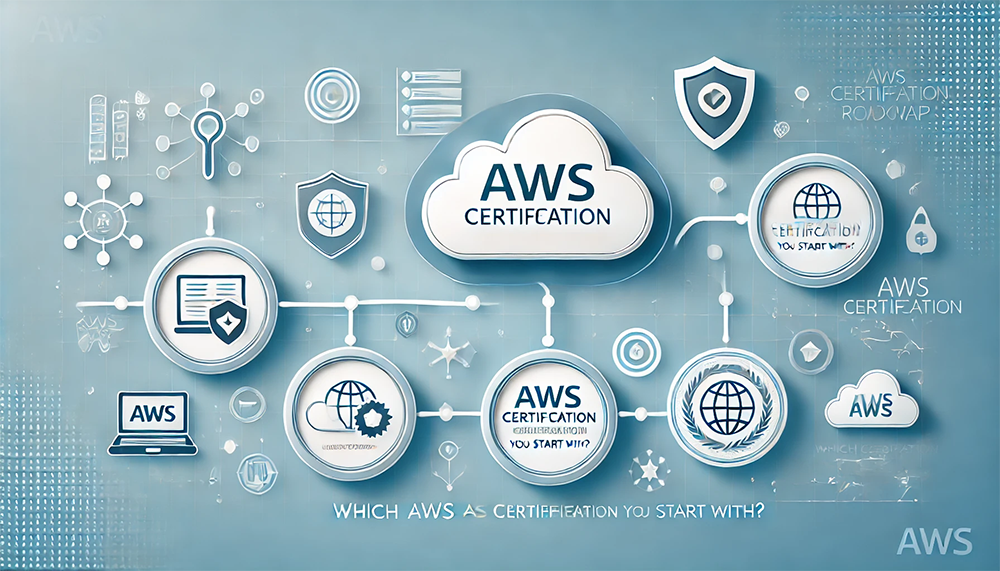AWS Certification Roadmap: Which AWS Certification Should You Start With?
The AWS Certification roadmap offers various paths for professionals based on their experience, role, and career goals. Deciding where to start depends on your background and where you want to take your cloud career. Here’s a guide to help you choose the right AWS certification to start with:
- Entry-Level: AWS Certified Cloud Practitioner
Who should take it?
- Beginners with no prior cloud or AWS experience.
- Professionals from non-technical backgrounds (e.g., sales, management) who want to understand AWS services and cloud concepts
What does it cover?
- Fundamental AWS services (compute, storage, networking).
- Basic security and compliance aspects of AWS.
- Cloud economics and pricing.
Why start here?
- This certification builds a strong foundation in cloud basics, providing an introduction to AWS before moving to more technical or role-specific certifications.
- Associate-Level Certifications
After Cloud Practitioner, or if you already have some basic cloud or IT knowledge, you can move on to AWS’s associate-level certifications. These are more technical and designed for specific roles.
- AWS Certified Solutions Architect – Associate
Who should take it?
- Those interested in designing and deploying scalable, secure, and cost-effective AWS systems.
- IT professionals and developers looking to strengthen their architecture skills.
What does it cover?
- Core AWS services for storage, compute, and networking.
- Best practices for architecting applications on AWS.
- Cost optimization strategies.
Why start here?
- It’s the most popular certification and ideal for those aiming to work as cloud architects or system administrators.
- AWS Certified Developer – Associate
Who should take it?
- Developers with some experience in AWS, looking to focus on building and deploying cloud applications.
What does it cover?
- AWS core services such as Lambda, DynamoDB, API Gateway.
- Application deployment and debugging.
Why start here?
- If you are a developer, this is a great choice to learn how to leverage AWS for building applications.
- AWS Certified SysOps Administrator – Associate
Who should take it?
- IT operations professionals or system administrators.
What does it cover?
- Managing and deploying AWS systems, monitoring and automation.
- AWS CLI, EC2, S3, and security measures.
Why start here?
- If your role involves managing and operating AWS environments, this certification focuses on system operations, monitoring, and performance optimization.
- Professional-Level Certifications
Once you have an associate certification or relevant experience, you can go for professional-level certifications. These are advanced and require more in-depth knowledge.
- AWS Certified Solutions Architect – Professional
Who should take it?
- Solutions architects with a minimum of 2-3 years of hands-on experience in AWS.
What does it cover?
- Complex AWS architectures, multi-tier applications, and hybrid systems.
- Advanced cost optimization, migration strategies, and scalability solutions.
Why start here?
- If you’re ready to dive into complex AWS solutions and manage enterprise-scale applications, this certification validates your expertise.
- AWS Certified DevOps Engineer – Professional
Who should take it?
- DevOps engineers focusing on automating infrastructure, monitoring, and implementing continuous delivery systems on AWS.
What does it cover?
- Advanced topics on CI/CD pipelines, automation, security, and cloud infrastructure.
Why start here?
- If you have hands-on experience with DevOps tools and practices, this is the path to validate your skills and work on more complex deployments.
- Specialty Certifications
AWS also offers specialized certifications in specific areas like security, big data, and machine learning. These are recommended for those with expertise in specific domains:
- AWS Certified Security – Specialty
- For professionals specializing in securing AWS workloads.
- AWS Certified Machine Learning – Specialty
- For professionals working with AI/ML services and data science.
- AWS Certified Data Analytics – Specialty
- For data analysts and engineers working on data lakes and analytics solutions in AWS.
Which AWS Certification Should You Start With?
- Beginners: Start with AWS Certified Cloud Practitioner if you are new to cloud and IT in general.
- Developers, SysAdmins, Architects with IT experience: Start with the AWS Solutions Architect – Associate, Developer – Associate, or SysOps Administrator – Associate, depending on your role.
- Experienced Professionals: If you have more hands-on AWS experience, aim for a professional or specialty certification that aligns with your career path.
By understanding your role and goals, you can select the certification that provides the right entry point into AWS and positions you for success.





